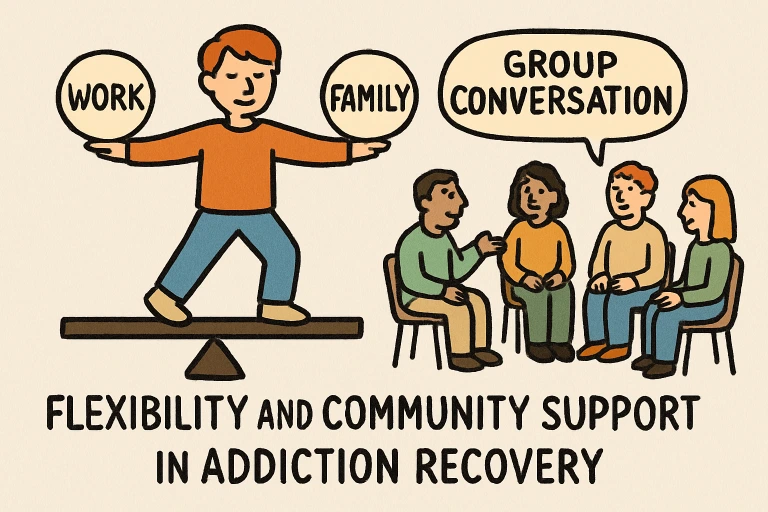Introduction
The journey to overcoming addiction is uniquely personal, requiring both compassionate support and practical strategies tailored to individual lifestyles. Intensive Outpatient Programs (IOPs) have emerged as a vital resource for individuals seeking robust, evidence-based recovery without the need for full-time residential care. Programs like the Intensive Outpatient Program in Ventnor, NJ empower individuals to continue their daily routines while engaging in structured treatment, bridging the gap between total immersion and independent living.
Unlike traditional inpatient approaches, IOPs offer an adaptable framework that allows participants to attend regular therapy sessions while fulfilling work, school, or family responsibilities. This balance is crucial in reinforcing new behaviors and coping mechanisms within the individual’s actual environment, which can significantly boost long-term recovery outcomes.
Understanding Intensive Outpatient Programs

Intensive Outpatient Programs (IOPs) provide a higher level of support than standard weekly counseling while allowing participants to remain at home rather than in a residential facility. Clients typically attend multiple sessions per week that focus on building practical skills, preventing relapse, and addressing the underlying psychological factors that contribute to substance use. Engaging in recovery while navigating everyday life allows participants to practice coping strategies in real situations, receiving guidance and feedback from both clinicians and peers. As Psychology Today notes, understanding addiction as a multifaceted condition can help individuals and their families better grasp the behavioral and mental health challenges involved. Intensive Outpatient Programs (IOPs) support individuals transitioning from inpatient care or managing recovery alongside work and family. By emphasizing practical strategies and leveraging social and community support, IOPs help maintain progress and reduce the risk of relapse.
Benefits of Intensive Outpatient Programs

- Flexibility and Real-World Integration: IOPs help individuals practice self-regulation and coping methods within their natural environments, which boosts confidence and accountability. This real-time application also enables rapid adjustments and tailored feedback from clinical teams, enhancing overall treatment efficacy.
- Cost-Effectiveness: These programs typically cost less than inpatient care, making them more accessible to a wider range of people. Participants can continue earning an income and fulfilling their obligations, thereby reducing the economic stresses often associated with recovery.
- Supportive Community Involvement: Many IOPs prioritize family therapy and education, helping patients and their loved ones develop open communication and mutual understanding. Ongoing support is crucial in preventing relapse, especially during difficult periods.
Key Components of IOPs
Intensive Outpatient Programs share core elements that distinguish them from other treatment models:
- Group Therapy: This form of therapy builds a sense of belonging and shared responsibility, encouraging members to support one another through similar struggles and victories.
- Individual Counseling: Personalized sessions enable a deeper exploration of mental health challenges and help tailor strategies to each participant’s unique needs.
- Educational Workshops: These workshops provide participants with information on substance use, healthy coping mechanisms, and essential life skills for sustained recovery.
- Family Involvement: Integrating loved ones helps address relational dynamics and creates a supportive home environment, both of which are critical for lasting change.
Evidence-Based Therapies in IOPs
The most effective Intensive Outpatient Programs (IOPs) rely on evidence-based approaches, with a strong emphasis on Cognitive Behavioral Therapy (CBT). CBT helps participants recognize harmful thought patterns and learn strategies to reframe them, leading to healthier coping mechanisms. For a detailed overview of how CBT works, see Verywell Mind. In addition to CBT, many programs incorporate methods such as motivational interviewing, dialectical behavior therapy, and trauma-informed care, all of which research shows can reduce relapse and support long-term recovery. Since addiction often overlaps with mental health conditions, programs that address co-occurring disorders offer the most holistic care, tackling both substance use and underlying issues like depression or anxiety.
Success Rates and Challenges
Research suggests that IOPs are associated with long-term sobriety rates of 50% to 70%, though results vary based on individual commitment, engagement, and the presence of robust support networks.
Programs that emphasize active participation, accountability, and ongoing support consistently report better outcomes than those relying on less-structured approaches.
While the flexibility and supportive environment of IOPs are major strengths, some participants may find it challenging to navigate daily temptations and stressors in early recovery. For these individuals, continued encouragement from family, group members, and therapists is critical.
Conclusion
Intensive Outpatient Programs are a cornerstone in modern addiction care, balancing comprehensive treatment with the realities of everyday life. By delivering evidence-based therapies, fostering supportive communities, and encouraging real-world practice, IOPs offer a path toward sustainable recovery for countless individuals and families. As the need for accessible, effective addiction treatment grows, IOPs will remain an essential resource for those pursuing long-term change.

